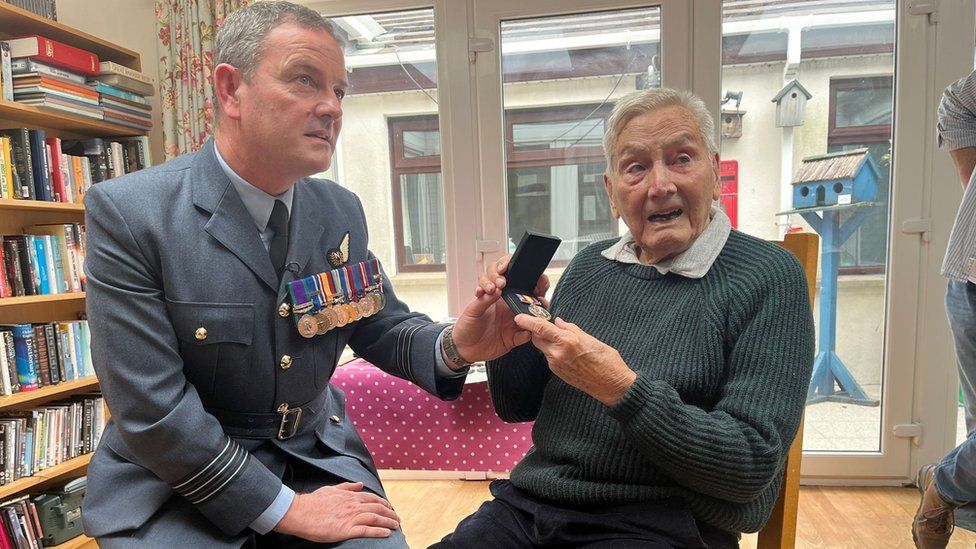King Charles gives medal to nuclear-testing veteran
- Published

Bernard Jenkins is presented with the Nuclear Test Medal
A veteran of the UK's nuclear testing programme in the 1950s has been presented with a medal from King Charles at his home in County Down.
Bernard Jenkins, 97, helped to oversee atomic bomb testing in the Australian desert in 1957.
The Nuclear Test Medal, which was released last year, was presented to Mr Jenkins by two senior RAF officers.
About 40,000 British personnel took part in the testing of atomic and hydrogen bombs in the 1950s and 1960s.
Fewer than 2,000 are believed to be still alive.
Mr Jenkins, who turns 98 next month, is one of the oldest veterans to receive the honour.
Speaking at his home in Portaferry after receiving the medal, he said: "I was a team member. Others were equally as good as me if not better. They were all brilliant people".
Asked about the dangers he faced during the nuclear testing, he said simply: "I trusted the people that we had."
One of the officers who presented Mr Jenkins with the medal was squadron leader Steve Hamilton from RAF Aldergrove.
He said: "Bernard's medal collection is quite unique. He has received recognition from three monarchs - King George VI, Her Majesty the Queen Elizabeth II and King Charles III also.
"That in itself is an incredible achievement."
Mr Jenkins served in the RAF after World War Two and rose to the rank of wing commander.
Although he was born in south Wales, he settled in Northern Ireland after marrying a woman from Dundonald, Margaret Kirk, in 1949.
Mr Jenkins with his wife Margaret and sons, Nicholas (L) and David (R)
While at Oxford University in the mid-1940s, he served in the same air squadron as two men who went on to become famous actors, Richard Burton and Robert Hardy.
Burton starred in the Hollywood blockbuster Cleopatra. He died in 1984.
Hardy featured in the TV series All Creatures Great and Small and also in four of the Harry Potter films. He died in 2017.
Mr Jenkins was a navigator in the RAF. In 1957, he was posted to Maralinga in a remote part of southern Australia as the joint services operations manager during the second phase of British nuclear bomb testing.
He took a photograph of the mushroom cloud created by one of the blasts.
Looking at the picture, Bernard's eldest son David says it shows that his father was only two or three miles away from the explosion.
"As a family we are extremely proud of him. He is a very humble man. He doesn't like to blow his own trumpet but the history in this one man is absolutely remarkable," he said.
"Since he joined the air force in 1944, he's always been proud to serve in the RAF. He has worked with all of the services but particularly the RAF - it's been his life."
As he reflected on his long career, Mr Jenkins said: "I would do it all again. I loved every minute of it."
The Nuclear Test Medal was released last year after veterans and their families fought for recognition
The awarding of the Nuclear Test Medal began last year. It followed a long fight for recognition by veterans and their families.
Many said that exposure to nuclear tests had caused cancer and premature deaths among thousands of people who took part, as well as causing health problems for their families.
The Ministry of Defence said three large studies of nuclear test veterans "found no valid evidence to link participation in these tests to ill health".
The government had previously refused calls for official recognition, saying that participation in the tests fell "outside the criteria for medallic recognition".
The medal features an atom surrounded by olive branches and bears the words "Nuclear Test Medal". The other side features King Charles.
Related Topics
- Published30 May 2021
- Published28 July 2023